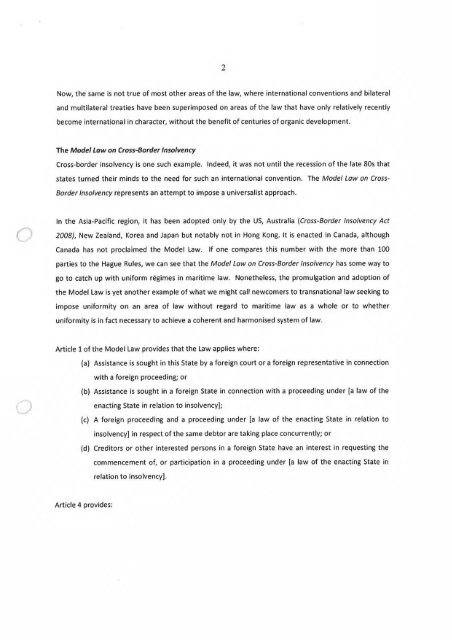COMITE MARITIME INTERNATIONAL
COMITE MARITIME INTERNATIONAL
COMITE MARITIME INTERNATIONAL
Create successful ePaper yourself
Turn your PDF publications into a flip-book with our unique Google optimized e-Paper software.
2Now, the same is not true of most other areas of the law, where international conventions and bilateraland multilateral treaties have been superimposed on areas of the law that have only relatively recentlybecome international in character, without the benefit of centuries of organic development.The Model Law on Cross-Border InsolvencyCross-border insolvency is one such example. Indeed, it was not until the recession of the late 80s thatstates turned their minds to the need for such an international convention. The Model Law on Crass-Border Insolvency represents an attempt to impose a universalist approach.In the Asia-Pacific region, it has been adopted only by the US, Australia (Cross-Border Insolvency Act2008), New Zealand, Korea and Japan but notably not in Hong Kong. It is enacted in Canada, althoughCanada has not proclaimed the Model Law. If one compares this number with the more than 100parties to the Hague Rules, we can see that the Model Law on Cross-Border Insolvency has some way togo to catch up with uniform regimes in maritime law. Nonetheless, the promulgation and adoption ofthe Model Law is yet another example of what we might call newcomers to transnational law seeking toimpose uniformity on an area of law without regard to maritime law as a whole or to whetheruniformity is in fact necessary to achieve a coherent and harmonised system of law.Article 1 of the Model Law provides that the Law applies where:(a) Assistance is sought in this State by a foreign court or a foreign representative in connectionwith a foreign proceeding; or(b) Assistance is sought in a foreign State in connection with a proceeding under [a law of theenacting State in relation to insolvency);(c) A foreign proceeding and a proceeding under [a law of the enacting State in relation toinsolvency] in respect of the same debtor are taking place concurrently; or(d) Creditors or other interested persons in a foreign State have an interest in requesting thecommencement of, or participation in a proceeding under [a law of the enacting State inrelation to insolvency).Article 4 provides:
















